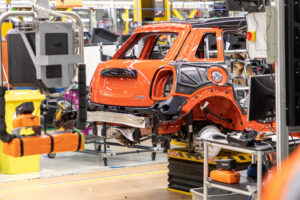
The motor industry has downgraded sales forecasts for the year by 9 per cent after rampant inflation in car prices, the cost-of-living crunch, rising interest rates and a lack of supply of vehicles from factories conspired to send new registrations tumbling last month.
Fewer than 120,000 new cars were registered in April, a year-on-year fall of nearly 16 per cent, according to figures from the Society of Motor Manufacturers and Traders. That prompted the industry body to cut its forecast for the year from 1.89 million vehicles to 1.72 million. While that number is marginally ahead of the result for 2021, it is at least 25 per cent lower than the average in recent years.
The official industry line is one of supply chain disruption, especially with microchips. “The worldwide semiconductor shortage continues to drag down the market, with global geopolitical issues threatening to undermine both supply and demand in the coming months,” Mike Hawes, chief executive of the industry body, said.
On the forecourt, traders are telling another story. “Demand is being dampened by the cost-of-living pressures,” Sue Robinson, director of the National Franchised Dealers Association, said. “Inflationary pressures are beginning to affect decision-making.”
Figures from dealerships show new-car price inflation is at 15 per cent a year — indeed, more in the second-hand market. While some reckon high fuel prices are pushing some motorists toward electric carst, zero-emission models typically are twice the price of their petrol equivalents.
“Rising inflation has been thrown into the mix,” John Wilmot, a car leasing expert, said. “Families are struggling with rising living costs and that is likely to make them more cautious about purchasing large-ticket items like a new car, even if the desire is there.”
James Fairclough, at AA Cars, said: “We’re seeing a steady stream of prospective buyers switch their focus to the second-hand market and many dealers report that sales of used vehicles are outpacing those of brand new models. In the current market, used cars have a clear advantage over their brand new rivals — availability.”
Diesel’s share of the passenger car market plumbed new lows as the fuel’s days looked numbered. According to the data, new diesel registrations accounted for 10.6 per cent of the market. Not so long ago, it was about half.
The depressed sales story is worse in the commercial van market, often taken as a bellwether of the health of smaller traders and an indicator of the general economy. New van registrations slumped by 29 per cent in the month, taking the numbers down for the year so far to a fall of 25 per cent.
The American maker of electric cars ships its vehicles to Britain and Europe towards the end of every trading quarter. In April, in the new quarter, only 261 new Teslas were registered in Britain.
In March, Tesla sold 12,921 of its Model 3 and Model Y vehicles. For context that is, in one month, more than the Vauxhall Corsa, the bestselling UK model of any fuel type in the first four months of the year to date, which has racked up registrations on 12,799 in the first 16 weeks.
Sales of pure electrics and cable-rechargeable hybrids, bulked up by the Tesla shipments, accounted for 22.7 per cent of the entire market in March. In April, sans Tesla deliveries, that plug-in share slipped to 15.8 per cent.
The motor trade body is forecasting that plug-in sales for the year as a whole will account for an unprecedented 25 per cent.
Read more:
New car sales hit the brakes as customers struggle






